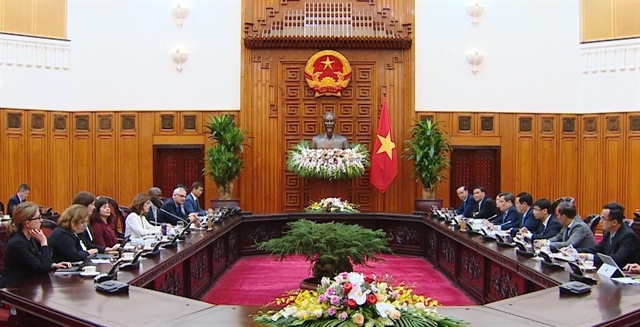 Economy
Economy

Deputy Prime Minister Vương Đình Huệ held talks with Senior Vice President and chief economist of the World Bank Pinelopi Koujianou Goldberg in Hà Nội on Monday.

|
| Deputy Prime Minister Vương Đình Huệ hold talks with Senior Vice President and chief economist of the World Bank Pinelopi Koujianou Goldberg in Hà Nội on Monday. — VNA/VNS Photo Dương Giang |
HÀ NỘI — Deputy Prime Minister Vương Đình Huệ held talks with Senior Vice President and chief economist of the World Bank Pinelopi Koujianou Goldberg in Hà Nội on Monday.
The economist is in Việt Nam to attend the Vietnam Reform and Development Forum 2019.
Deputy PM Huệ thanked the guest for promoting ties with Việt Nam and supporting its macro-economic development policies.
Apart from policy consultation, the WB has provided Việt Nam official development assistance and preferential loans worth nearly US$24 billion, about $18 billion of which have been disbursed.
He expressed his desire to discuss the strategic partnership between Việt Nam and the WB, priorities in socio-economic development strategy for 2021-25 and the impact of the global economy on Việt Nam, especially amid US-China trade tension.
As the Vietnamese economy is small, and its involvement in the global economy is limited, it is necessary to improve competitiveness and move up in the global value chain, he said, adding that he wished to listen to the WB’s forecasts on the issue and get suggestions to help Vietnamese firms join the global value chain more deeply.
The host also sought the WB’s recommendations on issues regarding agriculture, rural development and farmers, urban and regional economic development, and regional economic co-ordination.
Goldberg suggested Việt Nam export processed and high-value products and focus on technological innovation to further join the global value chain.
Another important point is reforming tertiary education and vocational training, with a focus on training soft skills for students and workers.
Both sides also looked into opportunities and challenges arising from the Fourth Industrial Revolution, policies to facilitate the private sector’s involvement in sci-tech development and improving workers’ income. — VNS




